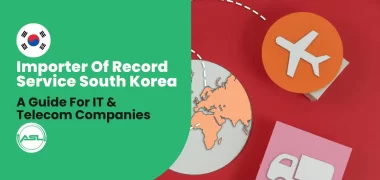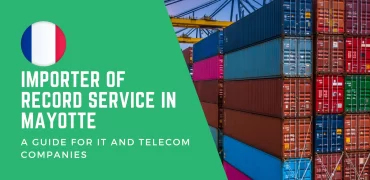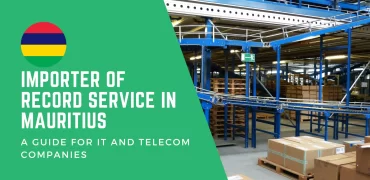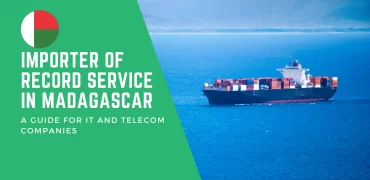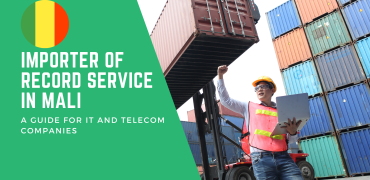South Korea’s IT and telecom sector is a global leader, renowned for its advanced technology and high-speed internet infrastructure. Home to tech giants like Samsung and LG, the country boasts one of the world’s highest smartphone penetration rates and fastest broadband speeds. The government’s proactive policies and substantial investments in R&D have fostered innovation and growth in this sector. South Korea is also at the forefront of 5G technology, driving the next wave of digital transformation. This vibrant sector significantly contributes to the nation’s economy, enhancing its position as a technological powerhouse on the global stage.
How Importers Can Import IT & Telecom Equipment in South Korea
Importing IT and telecom equipment into South Korea involves navigating a complex regulatory environment, ensuring compliance with rigorous standards, and overcoming logistical and market challenges. By understanding and preparing for these challenges, importers can effectively enter and compete in this dynamic and technologically advanced market. Leveraging local expertise, staying updated on regulatory changes, and adopting strategic planning are essential for successful market entry and sustainable operations.
Key Challenges
- Regulatory Compliance
- Complex Standards: South Korea has stringent standards for IT and telecom equipment, requiring thorough testing and certification. Keeping up with these evolving standards can be challenging.
- Certification Delays: Obtaining necessary certifications like the KC mark can be time-consuming, potentially delaying market entry.
- High Tariff and Tax Rates
- Duties and Taxes: Import duties and VAT can be significant, impacting the cost structure and pricing of imported products.
- Tariff Classification: Misclassification of products can lead to incorrect tariff applications, resulting in fines or delays.
- Language Barrier
- Documentation and Communication: All import documentation and communication with regulatory bodies are typically in Korean. This necessitates proficient language skills or reliable translation services.
- Market Competition
- Local Competitors: South Korea’s IT and telecom market is highly competitive, with strong local players like Samsung and LG dominating the market. Competing against these established brands requires significant marketing and differentiation strategies.
- Technological Expectations: South Korean consumers have high expectations for technology and innovation, requiring imported products to meet or exceed these standards.
- Logistical Challenges
- Efficient Logistics: Coordinating efficient logistics from international ports to South Korea, and then within the country, is critical but can be complex due to geographical and infrastructural factors.
- Customs Delays: Any issues with documentation or compliance can lead to customs delays, affecting the supply chain and inventory management.
- Economic Factors
- Currency Fluctuations: Exchange rate volatility can impact the cost of importing goods, affecting pricing and profitability.
- Economic Policies: Changes in trade policies or economic conditions in South Korea can influence import regulations and tariffs.
Duty/Tax Percentage Applied on IT & Telecom Equipment Import in South Korea
Importing IT and telecom equipment into South Korea involves understanding the applicable customs duties, Value Added Tax (VAT), and any other relevant fees. The duty and tax rates can vary depending on the specific type of equipment and its classification under the Harmonized System (HS) code.
Customs Duties
- Customs Duty Rates: The customs duty rates for IT and telecom equipment typically range from 0% to 8%. Many types of IT and telecom equipment, such as computers, smartphones, and networking devices, often benefit from relatively low to zero duty rates due to South Korea’s free trade agreements (FTAs) with various countries.
- HS Code Classification: Accurate classification of goods under the correct HS code is crucial, as it determines the applicable duty rate. Misclassification can lead to incorrect duty payments and potential fines.
Value Added Tax (VAT)
- Standard VAT Rate: The standard VAT rate in South Korea is 10%. This VAT is applied on the CIF (Cost, Insurance, and Freight) value of the goods plus any applicable customs duties.
- Calculation Example: If a piece of IT equipment has a CIF value of $1,000 and is subject to a 0% customs duty, the VAT would be 10% of $1,000, amounting to $100.
Other Fees and Levies
- Special Consumption Tax: Some high-end electronic products may be subject to a special consumption tax, though this is less common for standard IT and telecom equipment.
- Recycling Fees: There might be additional recycling fees for certain electronic goods to cover the cost of environmentally safe disposal and recycling.
ASL As Your Importer Of Record Service Provider
ASL, as an Importer of Record (IOR), can significantly assist IT and telecom companies by ensuring full compliance with South Korean import regulations, streamlining the customs clearance process, and mitigating risks associated with non-compliance. With extensive knowledge of local standards and documentation requirements, ASL handles all necessary certifications, reducing delays and potential penalties. Additionally, ASL provides efficient logistics management, from shipment tracking to final delivery, optimizing the supply chain. By leveraging ASL’s expertise and services, IT and telecom companies can focus on their core business activities, confident that their import operations are in expert hands.
